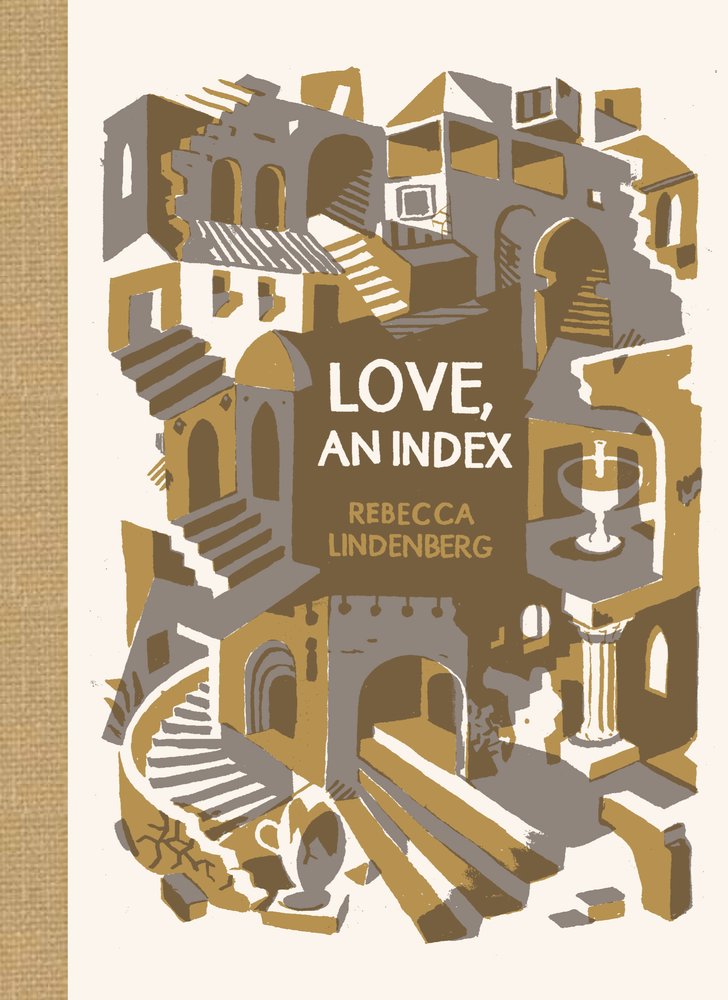It showed me what poetry has the potential to be.

“You are beautiful as a telephone, colors of bone, rocket ship, and cocktail lounge– Hmm, says the neon sign, starting an unfinishable thought. Where do we go from here?”
These are the opening lines of Rebecca Lindenberg’s debut poetry collection, titled Love, an Index. These lines set up beautifully the premise of an interrupted love, and the luminescent floundering that happened in the wake of it.
Much of the work in this volume deals with the death of Craig Arnold, Lindenberg’s late partner, who died in 2009 while hiking a volcano in Japan. Poems in the volume vacillate in time, reverberating between Lindenberg’s real-time experiences with Arnold and her attempts to cope in the aftermath of his death.
I read Rebecca Lindenberg’s Love, an Index for a creative writing class I took during the fall semester of 2022. It sits in PDF form in the “starred” folder of my email. I go back to it often. For me, this volume is about give and take, about asking things of your hands—hands that are inevitably too small to hold what’s given to them, whether that be grief or awe or overwhelm. It showed me what poetry has the potential to be.
The vibrancy of Lindenberg’s work doesn’t just manifest in burgeoning evocations of emotion. Colors themselves are brighter in her work—Love, an Index is overflowing with them. Lindenberg’s use of color is unique even among poets.
-
- In “Marblehead,” the volume’s final poem, “round olives are the green all green things aspire to be.”
- In “Illuminating,” “the sky is blues and yellows.”
- In “On the Sea,” a dead fish’s body is described as “angel-blue.”
- In “Love, a Footnote,” red is “long and slow”—like infrared waves, or sex.
These vivid colors (and the intuitive connections Lindenberg makes between these colors and her surrounding world) give rise to a work that is present and memorable.
Perhaps the most stylistically notable feature of Love, an Index is its innovation with form. Poems coalesce out of unlikely exigencies: catalogs, footnotes, dictionary entries, Facebook status updates– the list goes on.
Lindenberg’s fragment poems read like erasure poems; invisible text hovers just beneath the surface, barely suggested to the reader. The title poem, “Love, an Index” is an accomplishment in itself–a vast (alphabetized, as indices are) list of entries associated in some way with her love for Arnold. Or maybe, these entries are synonyms for it. The final entry contained in the index is “zephyr”—“the messenger of spring.”
One of my favorite aspects of Lindenberg’s work (perhaps necessitated by its subject matter) is the way she describes around things. In doing so, she gives life to empty space. This happens in “Litany,” one of my favorite poems from the volume:
“You said, that went well, don’t you think? Sun behind you I kissed the hole in the light and said: yes”
These lines don’t describe a lost lover, but they do describe the impression this lover makes on the surrounding environment–the way he blocks the light. To a superb degree, Lindenberg describes presence in terms of absence; she portrays the effect a subject has on the environment around it rather than the subject itself. As a result, her images are distinct and haunting.
Love, an Index, though in many ways a monument to an aching love, is also an account of transfiguration. Lindenberg takes the language of flowers and runs—her words bloom, amending and modifying this long-established language. She translates the languages of grieving and consolation into a mutually intelligible language. The speakers her poems portray shapeshift repeatedly—a person in the middle of love, a person bereaved (sometimes remembering or healing in the midst of this bereavement).
As reflected in the poem “Dispatches from an Unfinished World,” this volume is rife with premature endings—but it’s also wild, it’s a testament to rebirth. It’s grappling with loss. It’s kissing the hole in the light.



